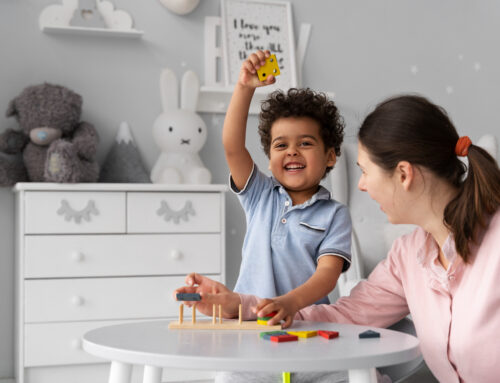Children with autism spectrum disorder (ASD) experience the world in unique and individual ways. As a parent, your priority is ensuring your child’s well-being and fostering their full potential, often involving personalized support services. If your child has autism or if you suspect they might, you might also observe signs of anxiety.
Children with autism can face anxiety, especially in new surroundings or when their routines change unexpectedly. Left unaddressed, anxiety in these children can lead to behaviors like stemming, social withdrawal, or even aggression.
Fortunately, occupational therapy (OT) offers promising strategies to help manage these challenges, providing a lifeline for children with autism to explore their worlds more comfortably.
Definition and Role of Occupational Therapy

Occupational therapy focuses on helping individuals perform daily activities or “occupations” with greater ease and independence. OT professionals address various challenges that may hinder children with autism from managing essential activities, including:
- Physical
- Emotional
- Mental
- Behavioral
- Sensory
- Developmental
- Cognitive
Additionally, occupational therapy may comprise sensory integration therapy or physical therapy. Sensory integration therapy helps kids better handle too much or too little sensory information, while physical therapy helps with skills like holding things with fingers.
For children struggling to reach their potential at home or excel in school, OT offers strategies to improve functioning levels. The core objective of OT is to empower anxious children by honing their social, learning, and wellness abilities, enabling them to participate in daily life actively.
Occupational therapists adopt a holistic approach, addressing all facets of a child’s needs to foster independence and confidence in engaging with activities. OT methods and strategies are tailored to each individual, typically encompassing:
- Environmental interaction
- Play skills
- Sensory issue management
- Self-care
- Behavior prevention
Therapists conduct comprehensive evaluations to understand the child’s requirements and aspirations and design personalized plans. For instance, one child may focus on mastering independent tasks like dressing and grooming, while another may emphasize speech and communication skills during sessions.
This approach not only equips children with autism to thrive in familiar environments but also helps them cultivate calmness and focus, which is particularly beneficial for those struggling with overstimulation and anxiety.
Understanding Anxiety in Children with Autism

Anxiety in children with autism can appear in diverse ways, ranging from physical signs like high heart rate and perspiration to behaviors such as avoidance, meltdowns, or fixation on specific interests.
These reactions often serve as coping mechanisms for overwhelming stimuli or situations. Understanding the underlying triggers of anxiety in children with autism is important for parents and caregivers to offer tailored support.
Managing Anxiety in Children With Autism

Every child with autism is unique, and various factors can trigger or worsen their anxiety. For example, an unpredictable social setting might increase your child’s stress. Anxiety triggers in children with autism can also include:
- Unfamiliar environments and experiences.
- New physical sensations, like sudden changes in temperature or uncomfortable clothing tags.
- Missing their special interests, such as a comforting toy or object.
- Internal thoughts and emotions.
Children with autism may not express anxiety in the same way as other children, making it challenging for parents and educators to recognize. Common signs of anxiety in children with autism can include:
- Frequent outbursts or meltdowns.
- Sleep difficulties.
- Avoiding specific situations.
- Engaging in self-harming behaviors like scratching or head-banging.
OT for children with autism and anxiety focuses on alleviating distressing symptoms and teaching coping strategies. For instance, if meeting new people triggers anxiety in a child with autism, an occupational therapist might develop a personalized calming technique they can use independently. OT can also assist your child in:
- Identifying anxiety triggers.
- Recognizing their anxiety.
- Addressing underlying challenges.
- Practicing coping strategies for anxious moments.
- Creating visual aids to manage anxiety-inducing situations.
In addition to these therapeutic approaches, occupational therapists may use various strategies such as:
- Designing sensory diets.
- Establishing safe sensory retreats.
- Using weighted blankets or compression wear.
- Incorporating communication aids or assistive technology.
- Decreasing sensory sensitivity to reduce anxiety during stressful situations.
- Collaborating with parents to identify signs of distress.
- Introducing meditation or breathing exercises for self-soothing.
- Providing sensory tools like fidget toys.
Occupational therapists may also integrate cognitive behavioral therapy (CBT) to address anxiety and autism symptoms. CBT focuses on managing emotional distress, challenging behaviors, and negative thought patterns through coping strategies.
How Occupational Therapy Supports Your Child

Managing anxiety and autism can pose significant challenges for children. Occupational therapists are valuable allies in helping them thrive in everyday environments and mitigating problematic behaviors.
Here are the key benefits of occupational therapy:
1. Enhances task focus: Some children with autism may struggle to concentrate due to feeling overwhelmed or overstimulated. Occupational therapists collaborate with your child at school or home to enhance their ability to focus on tasks one step at a time.
2. Promotes expressive skills: Many children resort to tantrums or emotional outbursts because they struggle to communicate their emotions. Occupational therapy empowers autistic children by teaching them constructive and rational ways to express themselves, fostering healthy emotional outlets, and enhancing their comfort in social interactions.
3. Improves overall well-being: Severe anxiety can significantly impact a child’s quality of life. Occupational therapists provide guidance and support, helping children manage anxiety symptoms effectively and equipping them with valuable coping strategies to navigate their condition.
4. Builds independence: While young children may not be entirely independent, occupational therapy services infuse confidence in children to handle tasks autonomously, such as personal grooming, self-feeding, or managing anxiety-triggering situations.
5. Enhances problem-solving skills: Children with autism often struggle to adapt to unexpected challenges. Occupational therapy introduces cognitive strategies for flexible problem-solving, empowering children to approach new situations with confidence and resilience.
6. Supports parental understanding: Occupational therapy benefits the entire family by deepening knowledge of your child’s triggers. This insight allows parents to actively engage in their child’s treatment, implement effective therapy techniques at home, and reduce their child’s stress levels.
7. Offers ongoing care: Occupational therapists provide comprehensive support across all areas of need, continuously monitoring progress, fostering skill development, and offering long-term guidance and assistance as needed.
Help Reduce Your Child’s Anxiety with Theracare

Children with autism and anxiety often face challenges in thriving both at home and in school. Occupational therapy services can significantly enhance your child’s overall well-being.
Anxiety is common in kids and can be treated. If parents and caregivers understand anxiety symptoms and how OT can help, they can assist their kids in managing and beating anxiety. Getting help early and giving the proper support can help kids be happy and healthy without anxiety. If you see signs of stress in your child, getting help from a professional is essential.
Therefore, we are here to help. Theracare Pediatric Services stands out as a leading provider of occupational therapy services, specializing in helping children manage stress and develop skills for a fulfilling life.
Don’t hesitate to contact Theracare Pediatric Services to start helping your child with anxiety.





